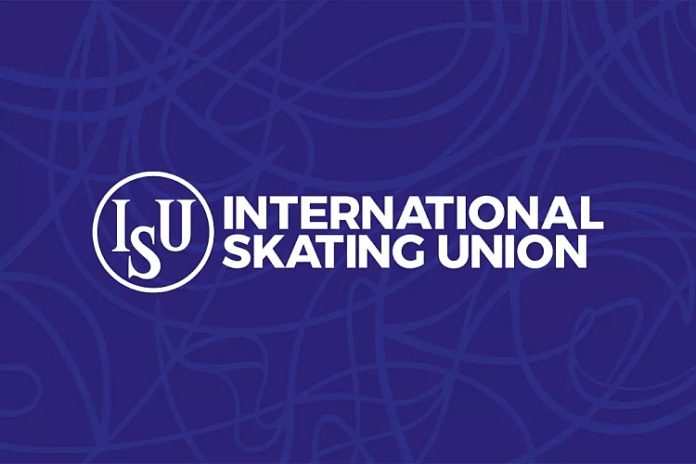★ The Sports Examiner: Chronicling the key competitive, economic and political forces shaping elite sport and the Olympic Movement.★
★ To get The Sports Examiner by e-mail: sign up here! ★
★ Friends: The bill is in for technical support costs. Donors have already picked up 30% of the total, but we need your help. Please consider a donation to help keep this site going. Thank you. ★
The International Skating Union’s Tuesday announcement of re-stated results for the Beijing 2022 Winter Games Team Event was odd in that it removed only the points scored by Russian star Kamila Valieva and did not change any other scores in the women’s Short Program or Free Skate.
The ISU statement referred to Article 10.10 of the ISU Anti-Doping Rules, which speaks directly to disqualifications of competitors in events subsequent to a doping violation, notes that:
“[A]ll other competitive results of the Skater obtained from the date a positive Sample was collected … or other antidoping rule violation occurred, through the commencement of any Provisional Suspension or Ineligibility period, shall, unless fairness requires otherwise, be Disqualified with all of the resulting Consequences including forfeiture of any medals, points and prizes.”
Under this section, Valieva was quite rightly disqualified and her points removed from the team scoring total (74-20 = 54). However, a deeper look at the rules makes things muddier.
● Rule 11.2.2 of the ISU Anti-Doping Rules is in a section titled “Consequences to Teams” and states:
“An anti-doping rule violation committed by a member of a team, including substitutes, occurring during or in connection with an Event may lead to Disqualification of all of the results obtained by the team in that Event with all Consequences for the team and its members, including forfeiture of all medals, points and prizes, except as provided in Article 11.2.3.”
The key phrase here is “in connection with an Event,” which in the Valieva case would indicate that her doping positive, revealed literally minutes after the Team Event finished on 7 February 2022, would appear to apply here. If so, the entire Russian team should be disqualified.
(The exception in 11.2.3 does not apply, since it lets a team continue without disqualification only if that team was not otherwise affected by the doping violation. Russia was most certainly impacted, since it would have won with a substitute for Valieva.)
● Even more important is Rule 353 of the ISU’s Special Regulations for Technical Rules for Singles, Pairs and Ice Dance.
In section 4, titled “Publication of Results,” the text is clear about scoring for disqualified competitors:
“Disqualified Competitors will lose their placements and be officially noted in the intermediate and final results as disqualified (DSQ). Competitors having finished the competition and who initially placed lower than the disqualified Competitor(s) will move up accordingly in their placement(s).”
This rule was in effect at the time of the Beijing Winter Games and clearly indicates that not only should Valieva’s points been deducted, but that other teams were affected:
● In the Short Program, Valieva won (10 points), but now all nine others should be advanced one place and have one point added to their totals.
● Same in the Free Skate, where Valieva won again, but the nine following skaters should all receive one more point.
This would make the final scores:
● 1. 67, United States (up from 65)
● 2. 65, Japan (up from 63)
● 3. 55, Canada (up from 53)
● 4. 54, Russia (down from 74)
● 5. 52, China (up from 50)
Canada should be the bronze-medal winner by reference to the ISU’s figure skating rules for scoring of disqualified athletes.
Have no doubt that a challenge to the ISU’s scoring – unless corrected – will come from Skate Canada on behalf of its team. The federation said so on Tuesday:
“Skate Canada is extremely disappointed with the International Skating Union’s (ISU) position on the long-awaited awarding of medals for the 2022 Beijing Olympic Games Figure Skating Team Competition.
“The Court for Arbitration for Sport (CAS) ruled that in addition to a four-year ban from competition, the ban includes ‘the disqualification [of] all competitive results’ achieved by Russian figure skater Kamila Valieva since the positive test. The ISU in its recent decision is not applying Rule 353, which states that ‘competitors having finished the competition and who initially placed lower than the disqualified competitor will move up accordingly in their placement.’
“Skate Canada strongly disagrees with the ISU’s position on this matter and will consider all options to appeal this decision.”
And Russia is planning a new appeal to the Court of Arbitration for Sport. The Russian Olympic Committee declared Tuesday:
“Our lawyers have already begun preparing the necessary documents for filing an appeal.
“We proceed from the fact that, in accordance with the current, applicable ISU rules, the consequences of the decision on sanctions in relation to an individual athlete, in this case Kamila Valieva, cannot be a basis for reviewing the results of a team tournament. Our legal position is based, among other things, on existing precedents in CAS practice.”
Noting Rule 353 cited above, this appears to be fantasy, but appeals can be filed.
The Russian news agency TASS quoted a statement from the International Olympic Committee that “the CAS decision brings clarity to this matter and the athletes competing in the team figure skating event at the 2022 Beijing Winter Olympics can finally receive the medals they have been waiting for.”
Nope. Not yet.
¶
You can receive our exclusive TSX Report by e-mail by clicking here. You can also refer a friend by clicking here, and can donate here to keep this site going.
For our new, 920-event International Sports Calendar for 2024 and beyond, by date and by sport, click here!
















